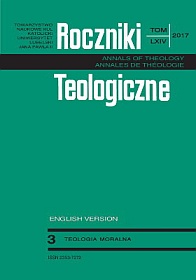Theological and Anthropological Analysi of Procreation in the Context of Contemporary Debate on Naprotechnology
Abstrakt
Immersed in the world dominated by pragmatism, contemporary man seems to be thinking and functioning only according to the criteria of effective acting. However, life experience, philosophical reflection, and the truth of Revelation lead to the conclusion that the laws of nature must be respected in the name of care for man and for one’s genuine good, even though they may, in certain cases, limit the effectiveness of acting and the possibility to acquire current profit.
This article justifies the necessity to respect natural law in the sphere of transmission of human life. The starting point of this scientific reflection is the theological vision of values and of the inviolability of human life on the basis of the description of creation from the Book of Genesis. The fundamental truths and moral norms are being neglected nowadays as—being so proud of modern technological achievements—man makes himself the creator and the master of human life. Although such activities seem impressive from the scientific point of view, they actually result in a number of serious contemporary and future threats. The second part of the article presents alarming aspects of artificial interventions in the sphere of life transmission. By exposing the threats and by trying to prevent them in the sphere of infertility treatment, the Church opposes the methods of artificial insemination and becomes engaged in promoting naprotechnology which is a method that expresses genuine humanism, and which gives hope not only to the parents who want to have a baby but also to the mankind that longs for propitious future.
Bibliografia
Chyrowicz, Barbara. “Spór o poprawianie ludzkiej natury.” In Etyka i technika w poszukiwaniu ludzkiej doskonałości (Etyka i technika, vol. 5). Ed. Barbara Chyrowicz. Lublin: Towarzystwo Naukowe Katolickiego Uniwersytetu Lubelskiego, 2004. 47–61.
Delsol, Chantal. Esej o człowieku późnej nowoczesności. Trans. Małgorzata Kowalska, Kraków: Znak, 2003.
Dziadosz, Dariusz. Tak było na początku… Izrael opowiada swoje dzieje. Literacka i teologiczna analiza wiodących tradycji Księgi Rodzaju. Przemyśl: Wydawnictwo Archidiecezji Przemyskiej, 2011.
Hilgers, Thomas W. Creighton Model Fertility Care System. Autentyczny język zdrowia i płodności kobiety. Podręcznik wprowadzający nowego użytkownika. Tłum. Elżbieta Marchlewska. Warszawa: Fundacja Instytut Rozwoju Położnictwa i Ginekologii, 2012.
http://info.wiara.pl/index.php?grupa=4&art=1224787537 (access 23.10.2008).
Januchowska, Małgorzata. “Naprotechnologia—chwyt czy metoda?” https://www.pfm.pl/artykuly/naprotechnologia–chwyt–czy–metoda/1562 (access 20.09.2016).
Kieniewicz, Piotr. Bioetyczny labirynt. Licheń Stary: Zakład Gospodarczy „Dom Pielgrzyma,” 2015.
Kieniewicz, Piotr. Człowiek niewygodny, człowiek potrzebny. Dyskusja antropologiczna w bioetyce amerykańskiej. Lublin: Wydawnictwo KUL, 2010.
Marzec, Paweł. Naprotechnologia—nowoczesna troska o płodność. Ujęcie teologicznomoralne. Tarnów, 2015.
Nadzieja na dziecko czyli cała prawda o naprotechnologii. Tomasz P. Terlikowski w rozmowie z prof. Thomasem W. Hilgersem. Warszawa: Fronda, 2015.
Nowosad, Sławomir. “Teologia i etyka a transhumanizm.” Roczniki Teologii Moralnej 60 (2013), 5: 59–81.
Skrzypczak, Robert. Chrześcijanin na rozdrożu. Kryzys w Kościele posoborowym. Kraków: WAM, 2011.
Weigel, George. Katedra i sześcian. Europa, Stany Zjednoczone i polityka bez Boga. Transl. Izabela i Piotr Zarębscy. Warszawa: Fronda, 2005.
Wróbel, Józef. Człowiek i medycyna. Teologicznomoralne podstawy ingerencji medycznych. Kraków: Wydawnictwo Księży Sercanów, 1999.
Copyright (c) 2017 Roczniki Teologiczne

Utwór dostępny jest na licencji Creative Commons Uznanie autorstwa – Użycie niekomercyjne – Bez utworów zależnych 4.0 Międzynarodowe.





